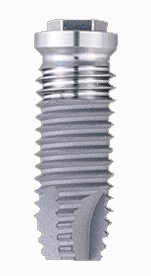Implantology

For about forty years, Implantology has become an increasingly important part of Prosthetics in Dental Medicine for the reconstruction of one or more lost teeth, up to that of entire edentulous mouths. Implants are not pins and are not called that! While the Pins and Post and Cores have a different shape and function in the reconstruction of each individual tooth, and are useful for strengthening and reconstructing what remains of a tooth or roots still capable of carrying prosthetic reconstructions, the Implants are titanium screws of different sizes and types, to be inserted into the bone, they are artificial roots crafted to replace the lost natural ones. In fact, in the laboratory the excellent dental technicians with whom we collaborate build the new teeth which will then be cemented by us or connected to the implant with a screw.
Success, as always, depends on the study and careful planning of the individual situation. Only in this case does the therapy become predictable and simple to carry out. Up to date, Implants are the main resource of the reconstructive treatment plans of edentulous areas taught in the American Schools of Specialization in Reconstructive and Prosthetic Dentistry, and beyond.
How is an implant positioned?
The anesthesia used is the same one used to anesthetize a decayed tooth to be treated and reconstructed. Once the part has been anesthetized, we act on the site where the small implant is to be positioned, which will be gently inserted there. Then one or more stitches are placed without difficulty in the gum above it, gum that will heal within a few days, or in other cases where it is possible to do so, the implant is inserted and loaded immediately, with a ad-hoc prosthetic reconstruction previously made.
How long does it take to integrate a dental implant?
The healing time of an implant after its insertion is called Osseointegration time (2-4 months) and varies depending on the quality of the bone, the type of implant that can be used, the patient's healing capacity, the your oral hygiene, and other factors. The time may also be longer if bone regeneration procedures are carried out where the implant is to be inserted.
Are there any possibilities of rejecting the implants?
Yes, they exist, but they are minimal, because SUCCESS is achieved in 98-99% of cases. The most common causes of immediate rejection are mostly linked to the patient's physical condition, which can sometimes be unknown even to the patient himself, such as silent and unknown or decompensated diabetes, or autoimmune diseases of a certain severity. Also very important is the way in which the patient follows the post-surgery instructions and maintains correct hygiene in his or her mouth, because the bacteria, just as they destroy the bone around the teeth (Periodontal Disease), can also destroy the bone around them. to implants (Peri-implant Disease).
How long can a dental implant last?
As mentioned above, the bone around implants can be attacked by bacteria like that around natural teeth. So again, poor oral hygiene, failure to comply with the Post-Surgery Instructions, chewing foods that can even break teeth, the habit of smoking in general, the uncontrolled use of drugs that act on bone metabolism, the lack of compliance with scheduled professional hygiene appointments, and less than ideal physical health, can create problems to the implants. Otherwise, they can last decades or a lifetime.
